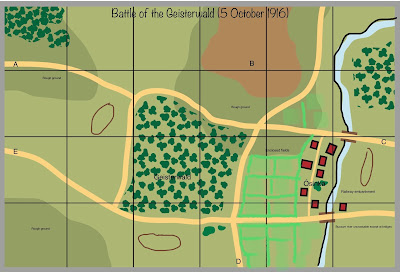A Hot Day’s Work
Battle of the Geisterwald, 5th October 1916 Northern Balkans
A scenario for Great Escape Games 1914 Rules (seriously mucked about with by TSOG)

German/Bulgarian OOB
 |

General Feldburger
Army of the Balkans
6th October 1916
General
Following the withdrawal of the army eastward from the 3rd onwards the 4th Division was ordered to cover the withdrawal to the Bucsum River. Engineer units reported to me early on the 5th that the covering Division lacked the means to destroy the crossings.
Though understrength and in need of relief I ordered the Division to the Bucsum crossings at Ósinka near the Geisterwald forest in order to hold them until such other orders were received.
As the 1st Bavarian Regiment approached the northern crossing, they reported a train drawing into Ósinka. In response, enemy artillery opened up ineffectually on the railway station. As the 1stBavarians started to cross the bridge, they reported several batteries of enemy artillery cresting the large hill to the right front. The batteries quickly unlimbered and commenced firing.

I sent the 2nd Bulgarian Regiment across the lower ford and they entered the field along the southern road as the Bavarians were starting to push forward. They did not report any enemy on the southern side of the village and it was clear that the artillery were in front of the main force and totally unsupported.

This attack was fiercely resisted, and the guns were fought to the muzzle. It was clear to the assaulting troops that the Russian guns were totally unsupported and, at least in the initial stages, there were no reported sightings of other enemy troops.

By this stage cavalry scouts had pushed forward on the south flank searching for the other Russians. The Bulgarian Colonel placed his machine guns strategically along the road and ordered the rest of the Regiment forward in support of the Bavarians.





On the right the Bulgarians had achieved their field position and commenced controlled volleys downslope at the sheltering Russians. From the elevated height the cover was not as effective, and casualties began to be inflicted.

A Russian battalion that had been sheltering in the Wheatfield amongst the haystacks advanced to effective firing range. In response one of the Bavarian machine gun units moved up in support of the Bulgarians and added their not inconsiderable firepower to the carnage that was unfolding in the valley below.
A second Russian battalion came forward to engage the Bulgarians and was likewise subjected to a withering fusillade. The edge of the Wheatfield was thick with Russian casualties. A supporting Russian machine gun unit fell back to the cover of the edge of the forest but was unable to provide much support.

To the south Russian infantry had advanced under cover of another Wheatfield and some rough ground to be within striking distance of the Bulgarian machine gun lines. The Cossacks charged down the road clearing one of the Bulgarian machine gun positions. However, fire from the support units drove them back to their start line.
Reports now arrived that at least one and possibly more Russian units were crossing the forest and making their way toward the thinly held village centre. The Bulgarians machine guns were fully committed dealing with the southern cavalry threat and the Bulgarian foot were dealing with the advancing enemy on the right flank.
The Elite Bavarian unit had taken casualties whilst crossing the river and were dug in along the eastern village edge. I was unsure whether they would be enough to hold the advancing Russians as there was no way of telling the exact number coming through the forest.

The second Bulgarian battalion also fell back into positions in support of the Germans whilst the remaining Bavarian machine gun unit sighted themselves at the northern crossroads.
I also ordered the second Bavarian battalion back from the hill to reinforce the remnants of the first battalion in the village. The forward observation officer from the divisional artillery accompanied them.

As the Russians emerged from the Geisterwald, it was obvious that the massed firepower available for the village defence was too strong and they turned and began to disengage. Scouting groups confirmed that at least two battalions had been destroyed in the wheatfield to the right flank. The Cossacks had not suffered many casualties. However, their ability to take the entire flank with only one battalion of infantry in support was always going to be difficult.
The Divisional artillery ineffectively harassed them as they retired.
I would like to report that we have accomplished our mission and await your further orders.
General Bolt
4th Division


No comments:
Post a Comment